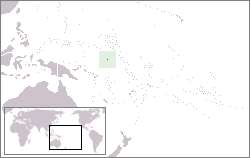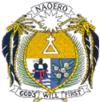Nauru
|
|
- For other uses, see Nauru (disambiguation).
The Republic of Nauru (pronounced nah-OO-roo), formerly known as Pleasant Island, is an island republic in the South Pacific Ocean. It is one of the world's smallest independent countries both in terms of population and land area and the smallest independent republic in both terms. It is also the smallest non-European country (in terms of land area).
Much of its past prosperity derived from the large amount of phosphate deposits on the island, believed to be either of guano or of marine origin. The phosphate is used as a fertilizer around the world and the majority of it has been exported to Australia. With the exhaustion of the phosphate supplies, Nauru faces an uncertain future. In the 1990s, it tried to gain new sources of income by introducing itself as a tax haven, but this story came to an end in July 2004.
Nauru currently houses a detention centre, which holds and processes asylum seekers as part of Australia's Pacific Solution.
| ||||
| National motto: God's Will First | ||||

| ||||
| Official language | English, Nauruan | |||
| Capital | None1 | |||
| Largest City | Yaren | |||
| President | Ludwig Scotty | |||
| Area - Total - % water | Ranked 192nd 21 km² Negligible | |||
| Population - Total (2001) - Density | Ranked 191st 12,329 590/km² | |||
| Independence | 31 January 1968 | |||
| Currency | Australian dollar</sup> | |||
| Time zone | UTC +12 | |||
| National anthem | Nauru Bwiema | |||
| Internet TLD | .nr | |||
| Calling Code | +674 | |||
|
1Yaren is the largest settlement. Nauru is the only country in the world with no official capital. | ||||
| Contents |
History
Main article: History of Nauru
Nauru was first settled by Polynesian and Melanesian settlers. The first European to arrive was Captain John Fearn in 1798, but Nauru continued as an independent island society, reigned by a king (the most widely known being King Auweyida), until it was annexed by Germany in 1888 to German New Guinea. Mining of its extensive phosphate reserves began early in the 20th century.
Following World War I, Nauru became a League of Nations Mandate territory in 1920, administered by Australia. In 1947, a trusteeship was approved by the United Nations. Nauru achieved independence in 1968. The founding president was Hammer DeRoburt. Nauru is a special member of the Commonwealth and joined the United Nations as a member state in 1999.
In 2001, a ship carrying refugees from various countries (including Afghanistan) and seeking to dock in Australia was diverted to Nauru as part of the Pacific Solution. The refugees were housed in a detention center in Nauru. As of 2004, all but 100 have been granted asylum in Australia.
Politics
Main article: Politics of Nauru
The 18-member Parliament is elected every three years. The Parliament elects a president from amongst its members, who appoints a Cabinet of five to six people. The President is both the head of state and head of government. There is a loose multiparty system; the two main parties are the Democratic Party and Nauru Party (informal).
Between 1999 and 2003, a series of no-confidence votes and elections resulted in two people, René Harris and Bernard Dowiyogo, leading the country for alternating periods. Dowiyogo died in office on March 10, 2003 in Washington, DC after heart surgery. Ludwig Scotty was elected President on May 29, 2003; however, in August 2003 there was another no confidence vote. Harris regained support and was re-elected president.
On October 1, 2004, Scotty declared a state of emergency and dissolved parliament after it failed to pass a national budget.
On June 1, 2005 Nauru severed diplomatic ties with China and re-established links with Taiwan.
Districts
Main article: Districts of Nauru
Nauru_map.jpg
Nauru has 14 districts:
Geography
Main article: Geography of Nauru
Nauru is a small phosphate rock island in the South Pacific Ocean, south of the Marshall Islands. The island is a raised atoll, with a surrounding reef exposed at low tide. Most of the population live on the narrow coastal belt. A central plateau, covering approximately four-fifths of the land area, rises 70 metres above sea level.
There are limited natural fresh water resources. Roof storage tanks collect rainwater, but islanders are mostly dependent on a single, aging desalination plant.
Intensive phosphate mining during the past 90 years - mainly by a UK, Australia, and New Zealand consortium - has left the central 90% of Nauru a wasteland and threatens limited remaining land resources.
Nauru's climate is extremely muggy year-round because of its proximity to the Equator.
Economy
Main article: Economy of Nauru
Denigomodu.jpg
Revenues of Nauru have come from exports of phosphates, but reserves are now almost exhausted. Phosphate production has declined since 1989, as demand has fallen in traditional markets and as the marginal cost of extracting the remaining phosphate increases, making it less internationally competitive. While phosphates previously gave Nauruans one of the highest per capita incomes in the Third World, few other resources exist, with most necessities being imported, including fresh water from Australia. The rehabilitation of mined land and the replacement of income from phosphates are serious long-term problems. The government has been borrowing heavily to finance fiscal deficits.
Another source of revenue was office rents from Nauru House, one of the tallest buildings in Melbourne, built on the profits from phosphates. Unfortunately, in the 1990s, mismanagement and corruption ruined the once-substantial savings of the island government. The huge earnings from the phosphates mining have been wasted, and now Nauru faces a very uncertain future. In November 2004, in an effort to pay off some Nauru's creditors, the nation's largest assets in Melbourne, including Nauru House, were sold for over $150 million.
In the 1990s, Nauru introduced itself as a tax haven, soon becoming one of the favourite spots for dirty money of the Russian mafia. A no-questions-asked policy enabled 70 billion dollars of assets belonging to Russian gangsters to be funneled to Nauru (an estimate by Central Bank of the Russian Federation). This led OECD's task force to identify Nauru as one of fifteen uncooperative tax havens in its fight against money laundering. For example, a bank could be established with as little as $25,000 without visiting the island or maintaining records. At present, Nauru's days as a banking centre are waning, with anti-avoidance legislation having been introduced and foreign hot money leaving the country.
Nauru is currently involved in an Australian lawsuit against the United States over a failed underground agreement. Nauru claims that agents representing the United States government offered billions of dollars worth of economic recovery to the island in exchange for new legislation limiting the efficacy of overseas money laundering and tax evasion as well as the establishment of a Nauruan "stooge" embassy in China to function under United States control as a means of secretly ushering defecting North Korean scientists and officials across the border, including Kyong Won-ha, the scientest supposedly responsible for much of Pyongyang's nuclear program. This initiative was termed "Operation Weasel." When news of this agreement surfaced after Nauru faithfully followed through with the necessary legislation and the preliminaries of the embassy (which rightfully drew suspicion from China as it was staffed entirely by westerners), the United States responded that the agents who made the deal with Nauru never had the authority to make such a contract, and Nauru has not yet received the promised aid. Nauru's case against the United States is still pending, but preliminary judgments favor the island nation over the superpower.
Demographics
Main article: Demographics of Nauru
The official language is Nauruan. English is widely understood, spoken, and used for most government and commercial purposes. The main religion is Christianity (two-thirds Protestant, one-third Roman Catholic). There is also a sizeable Baha'i community.
See also: Special distinctions of Nauru
Culture
Aiwo.jpg
Main article: Culture of Nauru
The island's traditional culture is all but vanished: Nauru is considered to be one of the most Westernized of the Pacific islands.
The national sport is Australian Rules Football. Nauru has also had international success in weightlifting. Marcus Stephen has been the most successful lifter to date, winning several Commonwealth Games medals. He was elected to Parliament in 2003. There is a stadium under construction in the district of Meneng.
Miscellaneous topics
- Special distinctions of Nauru
- People of note
- Communications in Nauru
- Transportation in Nauru
- Military of Nauru
- Politics of Nauru
- List of political parties in Nauru
- Foreign relations of Nauru
- Nauruan
- Nauru Phosphate Corporation
- Holidays in Nauru
External links
- "Paradise well and truly lost" (http://www.economist.com/displaystory.cfm?story_id=884045), The Economist, 20 December 2001
- "Nauru Island: Far Side Of Paradise" (http://www.monitor.net/monitor/0304a/nauru.html), Albion Monitor, 26 April, 2003
- Secretariat of the Pacific Community (http://www.spc.int) - Official site of the Pacific Community
- CIA World Factbook (http://www.cia.gov/cia/publications/factbook/geos/nr.html) - Information and statistics
- The Nauru Constitution (http://www.vanuatu.usp.ac.fj/paclawmat/Nauru_legislation/Nauru_Constitution.html)
- Country Profile (http://news.bbc.co.uk/1/hi/world/asia-pacific/country_profiles/1134221.stm) BBC News
- CenPacNet (http://www.cenpac.net.nr), the country's Internet service provider
- Yahoo! Travel Informations Nauru (http://travel.yahoo.com/p-travelguide-473702-nauru_vacations-i)
- Jane's Nauru Home Page (http://www.janeresture.com/nauru_home/index.htm)
- Radio program "This American Life" featured a 30-minute story on Nauru" (http://207.70.82.73/pages/descriptions/03/253.html)
- Consular Information Sheet (http://travel.state.gov/travel/cis_pa_tw/cis/cis_979.html)
Template:Pacific Islandsaf:Nauru ca:Nauru da:Nauru de:Nauru et:Nauru el:Ναουρού als:Nauru es:Nauru eo:Nauro fr:Nauru fy:Naurû gl:Nauru - Naoero ko:나우루 io:Nauru id:Nauru ia:Nauru it:Nauru he:נאורו ks:Nauru la:Naurum lv:Nauru lt:Nauru lb:Nauru li:Naoeroe mi:Nauru ms:Nauru zh-min-nan:Nauru na:Naoero nl:Nauru nds:Nauru ja:ナウル no:Nauru oc:Nauru pl:Nauru pt:Nauru ro:Nauru rm:Nauru ru:Науру sq:Nauru scn:Nauru simple:Nauru sk:Nauru sl:Nauru fi:Naurun tasavalta sv:Nauru th:ประเทศนาอูรู tr:Nauru uk:Науру zh:瑙鲁

